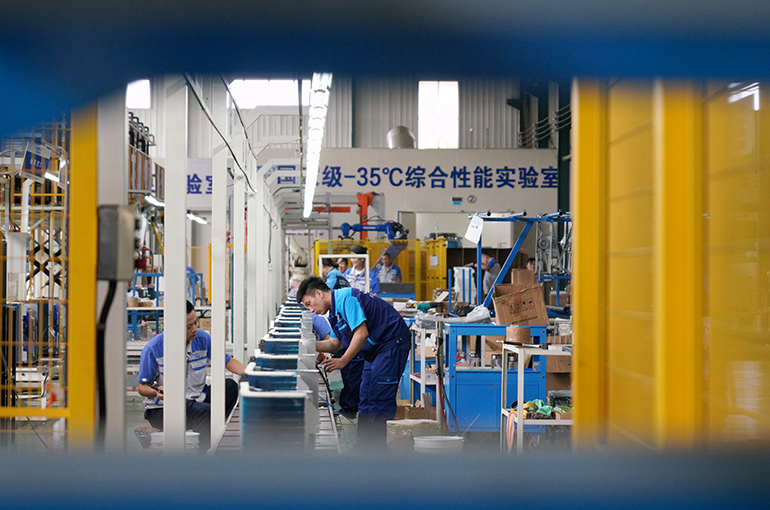 China Calls for Greater Use of Heat Pumps to Save Energy, Cut Emissions
China Calls for Greater Use of Heat Pumps to Save Energy, Cut Emissions(Yicai) April 3 -- The Chinese government is pushing for the increased uptake of heat pumps, which are energy-efficient devices used to heat and cool buildings, as well as more research to improve the efficiency of these systems, so as to reduce carbon emissions and support the country’s green energy goals.
The use of heat pumps in buildings and the overall installed capacity of heat pump systems, which work by extracting energy from the surrounding environment, should be increased, according to a document released by six government departments, including the National Development and Reform Commission and the National Energy Administration, yesterday.
And the efficiency of heat pumps should be further improved by more than 20 percent by enhancing manufacturing and tech development, the document added.
Although China was a late starter in the heat pump sector, it is now a global leader in terms of production and sales. Sales have surged by an average of 17 percent a year in the past decade, and are now worth around CNY33 billion (USD4.5 billion), up from CNY8 billion (USD1 billion) in 2014.
Heat pump use in China still lags behind other countries, even though local governments have been promoting their use, said Li Xindi, director of the energy transition program at the Institute for Global Decarbonization Process. For example, in 2022, heat pumps accounted for over 30 percent of the US heating market, while in China this share was just over 8 percent.
Under the current energy structure and pricing system, using heat pumps for heating is still more expensive than that of conventional heating methods and this is proving to be a barrier to their adoption, said Yang Lingyan, researcher at the China Academy of Building Research.
To encourage more people to use heat pumps, some local governments have introduced subsidies. For example, the Beijing Municipal Bureau of Agriculture said last October that rural residents who buy heat pump heating equipment will receive a subsidy of up to 40 percent of the sales price, with a maximum subsidy of CNY6,000 (USD823) per household.
With the support of subsidies, the heat pump market is growing rapidly, said Yang Li, deputy director at the Beijing-based iGDP. On top of providing energy-efficient, low-carbon and eco-friendly hot water and heating solutions for homes and businesses, heat pumps are also playing a role in industries such as lithium battery drying and tobacco leaf drying.
Finding market-based ways for heat pumps to generate profits is key to increasing their market penetration, said Chen Jingying, a researcher at the China Program at the Regulatory Assistance Project. For example, distributed energy stations in residential or commercial areas can be built to provide both heating and electricity. This would help cut heat pump operators’ costs while at the same time allowing them to make money from selling power.
Editors: Tang Shihua, Kim Taylor